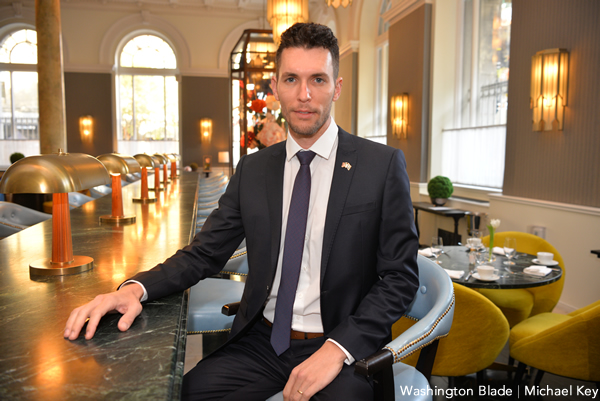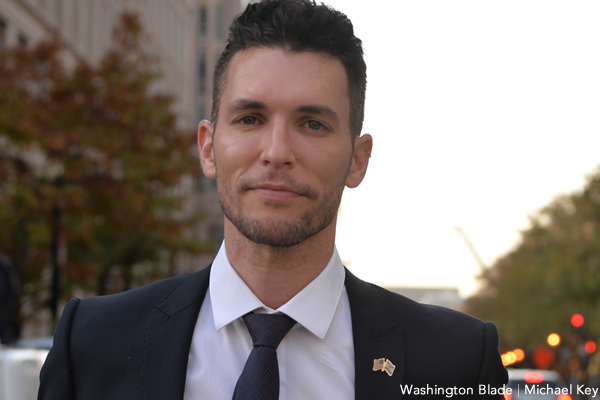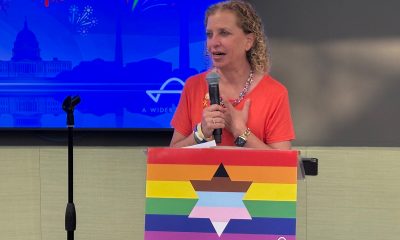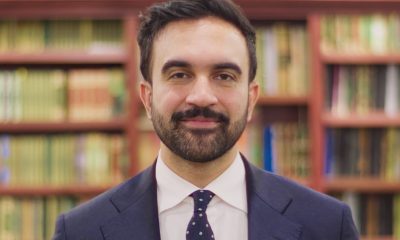World
Israeli deputy foreign minister denies country engages in ‘pinkwashing’
Idan Roll, 37, lives in Tel Aviv with husband, two children

Israel’s openly gay deputy foreign minister this week dismissed the idea that his country’s government promotes LGBTQ rights in order to divert attention away from its policies towards the Palestinians.
“I would never, ever, put myself in a position that I would be the face of ‘pinkwashing’ as part of my role because I’m confident that there’s no such thing in Israel,” Idan Roll told the Washington Blade on Wednesday during an interview at the Riggs Hotel in downtown D.C.
Roll, 37, spoke with the Blade at the end of a 4-day trip to D.C., which took place less than six months after eight political parties formed a coalition government that ousted long-time Prime Minister Benjamin Netanyahu.
The Knesset earlier this month passed Israel’s first national budget in three years. Roll, who is the youngest person in the Israeli government, noted to the Blade it earmarks $30 million (NIS 90 million) to LGBTQ organizations across the country.
Health Minister Nitzan Horowitz in August announced Israel had lifted restrictions on blood donations from men who have sex with men. The Israeli Supreme Court in July ruled same-sex couples and single men must be allowed to have a child via surrogate.
A group of teenagers on Nov. 12 attacked a group of LGBTQ young people near Jerusalem’s main bus station as they were traveling to a transgender rights conference in Tel Aviv. Neil Patrick Harris is among the actors who expressed their support for the Tel Aviv International LGBT Film Festival amid calls from BDS (boycott, economic divestment and sanctions) Movement supporters to boycott it over Israel’s policies towards the Palestinians.
Roll acknowledged Israel does not extend civil marriage to same-sex couples, but he also pointed out to the Blade the country does not “have civil marriage for straight people either” because marriage in the Jewish state is a religious institution. Roll noted he is among the openly LGBTQ people in the Israeli government and they “live a full, fulfilling life.”
“Are we perfect?” he asked rhetorically. “No. Are we one of the best places for gay people to live in the world? Definitely so, and I feel safe. And I feel welcomed. And I feel empowered and I feel like the best of it is ahead.”
Roll told the Blade the idea of “pinkwashing” comes from the fact “that not everyone is as informed as others about life in Israel.”
“That’s something that’s a task this new government and our ministry has, to better convey the Israeli story, and it’s a wonderful and complex and diverse story,” he said.
Roll also stressed he “would love for people to stop pinning one thing against the other.”
“Us doing tremendous work for LGBTQ equality does not get eliminated or erased or cancelled just because we have to also manage a very intricate conflict, which is the Israeli-Palestinian conflict,” he said. “Promoting progressive values is still something that is worth mentioning, and we are working towards bettering the lives of the Palestinians on a humanitarian and economic level. Things are not as black and white as they are portrayed.”

Roll lives in Tel Aviv with his husband, Harel Skaat, an Israeli pop star who he married in Utah in March, and their two children who they had via surrogates in the U.S.
The lawyer and former model who is a member of the centrist Yesh Atid party founded Pride Front, a group that encourages LGBTQ Israelis to become involved with the country’s political process. Roll told the Blade he decided to run for office after he and his husband started their family.
“It was quite a struggle,” he said, noting their second child was born via surrogate in Oklahoma. “And then it struck me that I have to practice what I preach. I have to not only just encourage others to take political action and move forward, but also I had to take the lead.”
Roll in 2019 won a seat in the Israeli Knesset. Lapid appointed Roll as deputy foreign minister after the new government took office.
“I’m a very young member of this government … and I am an openly gay member of this government,” said Roll. “I am very grateful of the life that I have been able to create for myself in Israel.”
“That’s a story that I feel like I can portray very authentically and I think that’s a story that needs to be told outside of Israel,” he added. “I’m also very proud to be part of the new face of a new government that is doing things differently and in a way I think now allows people of all different ethnicities and colors and agendas to find someone they can relate to in this government.”

U.S. Sens. Tammy Baldwin (D-Wis.), Jon Ossoff (D-Ga.), Chris Van Hollen (D-Md.), Bill Hagerty (R-Tenn.), U.S. Rep. Ritchie Torres (D-N.Y.) and other members of the Congressional LGBTQ+ Equality Caucus are among those who met with Roll when he was in D.C. Roll also sat down with Deputy National Security Advisor Jon Finer, Deputy Secretary of State Wendy Sherman, American Israel Public Affairs Committee members and Jewish students at George Washington University.
I was privileged to meet members of the @LGBTEqCaucus to discuss how we can promote #LGBTQ rights & how much we have in common in the pursuit of #Equality. I met a group of friends who care deeply about 🇮🇱🇺🇸 relations & I look forward to working w/ them to strengthen our alliance pic.twitter.com/9ZTJAAT65G
— Idan roll – עידן רול (@idanroll) November 17, 2021
It was a great pleasure to meet with @RepRitchie today. He is a true friend of Israel and a mensch. The personal experiences he shared provided important insights to help strengthen the U.S. — Israel alliance and I am grateful for his unwavering support for Israel 🇺🇸🇮🇱 pic.twitter.com/EKJRvRhSs2
— Idan roll – עידן רול (@idanroll) November 17, 2021
I enjoyed meeting again with progressive leader @SenatorBaldwin during my visit to Washington. We continued our conversation from just last week in Jerusalem, discussing ways to further strengthen the US-Israel relationship on the basis of our countries’ shared values. pic.twitter.com/K1KkAxZlPz
— Idan roll – עידן רול (@idanroll) November 18, 2021
“We have a new government, and the new government is really different in many great ways,” Roll told the Blade. “It’s the most diverse government in our history and in a way it is the most diverse reflection of a very diverse society.”
He said one of the reasons he traveled to D.C. was “to reach out and to open a dialogue.” Roll also stressed Israel “has always been a bipartisan issue.
“It’s crucial to keep it that way and we intend to do that,” he said. “The U.S. is the most cherished and important ally we have and you need to cultivate relationships.”
Books
New book profiles LGBTQ Ukrainians, documents war experiences
Tuesday marks four years since Russia attacked Ukraine

Journalist J. Lester Feder’s new book profiles LGBTQ Ukrainians and their experiences during Russia’s war against their country.
Feder for “The Queer Face of War: Portraits and Stories from Ukraine” interviewed and photographed LGBTQ Ukrainians in Kyiv, the country’s capital, and in other cities. They include Olena Hloba, the co-founder of Tergo, a support group for parents and friends of LGBTQ Ukrainians, who fled her home in the Kyiv suburb of Bucha shortly after Russia launched its war on Feb. 24, 2022.
Russian soldiers killed civilians as they withdrew from Bucha. Videos and photographs that emerged from the Kyiv suburb showed dead bodies with their hands tied behind their back and other signs of torture.

Olena Shevchenko, chair of Insight, a Ukrainian LGBTQ rights group, wrote the book’s forward.

The book also profiles Viktor Pylypenko, a gay man who the Ukrainian military assigned to the 72nd Mechanized Black Cossack Brigade after the war began. Feder writes Pylypenko’s unit “was deployed to some of the fiercest and most important battles of the war.”
“The brigade was pivotal to beating Russian forces back from Kyiv in their initial attempt to take the capital, helping them liberate territory near Kharkiv and defending the front lines in Donbas,” wrote Feder.
Pylypenko spent two years fighting “on Ukraine’s most dangerous battlefields, serving primarily as a medic.”
“At times he felt he was living in a horror movie, watching tank shells tear his fellow soldiers apart before his eyes,” wrote Feder. “He held many men as they took their final breaths. Of the roughly one hundred who entered the unit with him, only six remained when he was discharged in 2024. He didn’t leave by choice: he went home to take care of his father, who had suffered a stroke.”
Feder notes one of Pylypenko’s former commanders attacked him online when he came out. Pylypenko said another commander defended him.
Feder also profiled Diana and Oleksii Polukhin, two residents of Kherson, a port city in southern Ukraine that is near the mouth of the Dnieper River.
Ukrainian forces regained control of Kherson in November 2022, nine months after Russia occupied it.
Diana, a cigarette vender, and Polukhin told Feder that Russian forces demanded they disclose the names of other LGBTQ Ukrainians in Kherson. Russian forces also tortured Diana and Polukhin while in their custody.
Polukhim is the first LGBTQ victim of Russian persecution to report their case to Ukrainian prosecutors.

Feder, who is of Ukrainian descent, first visited Ukraine in 2013 when he wrote for BuzzFeed.
He was Outright International’s Senior Fellow for Emergency Research from 2021-2023. Feder last traveled to Ukraine in December 2024.
Feder spoke about his book at Politics and Prose at the Wharf in Southwest D.C. on Feb. 6. The Washington Blade spoke with Feder on Feb. 20.
Feder told the Blade he began to work on the book when he was at Outright International and working with humanitarian groups on how to better serve LGBTQ Ukrainians. Feder said military service requirements, a lack of access to hormone therapy and documents that accurately reflect a person’s gender identity and LGBTQ-friendly shelters are among the myriad challenges that LGBTQ Ukrainians have faced since the war began.
“All of these were components of a queer experience of war that was not well documented, and we had never seen in one place, especially with photos,” he told the Blade. “I felt really called to do that, not only because of what was happening in Ukraine, but also as a way to bring to the surface issues that we’d had seen in Iraq and Syria and Afghanistan.”

Feder also spoke with the Blade about the war’s geopolitical implications.
Russian President Vladimir Putin in 2013 signed a law that bans the “promotion of homosexuality” to minors.
The 2014 Winter Olympics took place in Sochi, a Russian resort city on the Black Sea. Russia annexed Crimea from Ukraine a few weeks after the games ended.
Russia’s anti-LGBTQ crackdown has continued over the last decade.
The Russian Supreme Court in 2023 ruled the “international LGBT movement” is an extremist organization and banned it. The Russian Justice Ministry last month designated ILGA World, a global LGBTQ and intersex rights group, as an “undesirable” organization.
Ukraine, meanwhile, has sought to align itself with Europe.
Ukrainian President Volodymyr Zelenskyy after a 2021 meeting with then-President Joe Biden at the White House said his country would continue to fight discrimination based on sexual orientation and gender identity. (Zelenskyy’s relationship with the U.S. has grown more tense since the Trump-Vance administration took office.) Zelenskyy in 2022 publicly backed civil partnerships for same-sex couples.
Then-Ukrainian Ambassador to the U.S. Oksana Markarova in 2023 applauded Kyiv Pride and other LGBTQ and intersex rights groups in her country when she spoke at a photo exhibit at Ukraine House in D.C. that highlighted LGBTQ and intersex soldiers. Then-Kyiv Pride Executive Director Lenny Emson, who Feder profiles in his book, was among those who attended the event.
“Thank you for everything you do in Kyiv, and thank you for everything that you do in order to fight the discrimination that still is somewhere in Ukraine,” said Markarova. “Not everything is perfect yet, but you know, I think we are moving in the right direction. And we together will not only fight the external enemy, but also will see equality.”
Feder in response to the Blade’s question about why he decided to write his book said he “didn’t feel” the “significance of Russia’s war against Ukraine” for LGBTQ people around the world “was fully understood.”
“This was an opportunity to tell that big story,” he said.
“The crackdown on LGBT rights inside Russia was essentially a laboratory for a strategy of attacking democratic values by attacking queer rights and it was one as Ukraine was getting closet to Europe back in 2013, 2014,” he added. “It was a strategy they were using as part of their foreign policy, and it was one they were using not only in Ukraine over the past decade, but around the world.”
Feder said Republicans are using “that same strategy to attack queer people, to attack democracy itself.”
“I felt like it was important that Americans understand that history,” he said.
Netherlands
Rob Jetten becomes first gay Dutch prime minister
38-year-old head of government sworn in on Monday

Rob Jetten on Monday became the Netherland’s first openly gay prime minister.
Jetten’s centrist D66 party won the country’s elections last October, narrowly defeating Geert Wilders’ far-right Party for Freedom.
King Willem-Alexander on Monday swore in Jetten, who is also the country’s youngest-ever prime minister. The Associated Press notes Jetten’s coalition government includes the center-right Christian Democrats and the center-right People’s Party for Freedom and Democracy.
“Proud to be able to do this together,” said Jetten in an X post before Willem-Alexander swore him in.
COC Nederland, a Dutch LGBTQ advocacy group, in a statement said Jetten “becoming prime minister shows that your sexual orientation doesn’t have to matter.”
“You can become a construction worker, a doctor, a lawyer, and even prime minister,” said COC Nederland.
The advocacy group noted Jetten has said his government will implement its “Rainbow Agreement” that include calls for strengthening nondiscrimination laws “to better protect transgender and intersex people,” appointing more “discrimination investigators … to address violence against LGBTQ+ people and other minorities,” and introducing measures “to promote acceptance in schools.”
“COC will hold the Cabinet to that promise,” said COC Nederland.
Jetten’s fiancé is Nicolás Keenen, an Argentine field hockey player who competed in the 2024 Summer Olympics in Paris.
Jetten is one of two openly gay heads of government: Andorran Prime Minister Xavier Espot Zamora came out in 2023. Gay Latvian President Edgars Rinkēvičs, who is the country’s head of state, took office in 2023.
Leo Varadkar, who was Ireland’s prime minister from 2017-2020 and from 2022-2024, and Xavier Bettel, who was Luxembourg’s prime minister from 2013-2023, are gay. Ana Brnabić, who was Serbia’s prime minister from 2017-2024, is a lesbian.
Former Icelandic Prime Minister Jóhanna Sigurðardóttir in 2009 became the world’s first openly lesbian head of government. Former Belgian Prime Minister Elio Di Rupo, former San Marino Captain Regent Paolo Rondelli, and former French Prime Minister Gabriel Attal are also openly gay.
Colombian presidential candidate Claudia López, who is the former mayor of Bogotá, the Colombian capital, would become her country’s first female and first lesbian president if she wins the country’s presidential election that is taking place later this year.
Ecuador
Justicia reconoce delito de odio en caso de bullying en Instituto Nacional Mejía de Ecuador
Johana B se suicidó el 11 de abril de 2023

A casi tres años del suicidio de Johana B., quien estudió en el Instituto Nacional Mejía, colegio emblemático de Quito, el Tribunal de la Corte Nacional de Justicia ratificó la condena para el alumno responsable del acoso escolar que la llevó a quitarse la vida.
Según información de la Fiscalía, el fallo de última instancia deja en firme la condena de cuatro años de internamiento en un centro para adolescentes infractores, en una audiencia de casación pedida por la defensa del agresor, tres meses antes de que prescriba el caso.
Con la sentencia, este caso es uno de los primeros en el país en reconocer actos de odio por violencia de género, delito tipificado en el artículo 177 del Código Orgánico Penal Integral (COIP).
El suicidio de Johana B. ocurrió el 11 abril de 2023 y fue consecuencia del acoso escolar por estereotipos de género que enfrentó la estudiante por parte de su agresor, quien constantemente la insultaba y agredía por su forma de vestir, llevar el cabello corto o practicar actividades que hace años se consideraban exclusivamente para hombres, como ser mando de la Banda de Paz en el Instituto Nacional Mejía.
Desde la muerte de Johana, su familia buscaba justicia. Su padre, José, en una entrevista concedida a edición cientonce para la investigación periodística Los suicidios que quedan en el clóset a causa de la omisión estatal afirmó que su hija era acosada por su compañero y otres estudiantes con apodos como “marimacha”, lo que también fue corroborado en los testimonios recogidos por la Unidad de Justicia Juvenil No. 4 de la Fiscalía.
Los resultados de la autopsia psicológica y del examen antropológico realizados tras la muerte de Johana confirmaron las versiones de sus compañeras y docentes: que su agresor la acosó de manera sistemática durante dos años. Los empujones, jalones de cabello o burlas, incluso por su situación económica, eran constantes en el aula de clase.
La violencia que recibió Johana escaló cuando su compañero le dio un codazo en la espalda ocasionándole una lesión que le imposibilitó caminar y asistir a clases.
Días después del hecho, la adolescente se quitó la vida en su casa, tras escuchar que la madre del agresor se negó a pagar la mitad del valor de una tomografía para determinar la lesión en su espalda, tal como lo había acordado previamente con sus padres y frente al personal del DECE (Departamento de Consejería Estudiantil del colegio), según versiones de su familia y la Fiscalía.
#AFONDO | Johana se suicidó el 11 de abril de 2023, tras ser víctima de acoso escolar por no cumplir con estereotipos femeninos 😢.
Dos semanas antes, uno de sus compañeros le dio un codazo en la espalda, ocasionándole una lesión que le imposibilitó caminar 🧵 pic.twitter.com/bXKUs9YYOm
— EdicionCientonce (@EdCientonce) September 3, 2025
“Era una chica linda, fuerte, alegre. Siempre nos llevamos muy bien, hemos compartido todo. Nos dejó muchos recuerdos y todos nos sentimos tristes; siempre estamos pensando en ella. Es un vacío tan grande aquí, en este lugar”, expresó José a Edición Cientonce el año pasado.
Para la fiscal del caso y de la Unidad de Justicia Juvenil de la Fiscalía, Martha Reino, el suicidio de la adolescente fue un agravante que se contempló durante la audiencia de juzgamiento de marzo de 2024, según explicó a este medio el año pasado. Desde entonces, la familia del agresor presentó un recurso de casación en la Corte Nacional de Justicia, que provocó la dilatación del proceso.
En el fallo de última instancia, el Tribunal también dispuso que el agresor pague $3.000 a la familia de Johana B. como reparación integral. Además, el adolescente deberá recibir medidas socioeducativas, de acuerdo al artículo 385 del Código Orgánico de la Niñez y Adolescencia, señala la Fiscalía.
El caso de Johana también destapó las omisiones y negligencias del personal del DECE y docentes del Instituto Nacional Mejía. En la etapa de instrucción fiscal se comprobó que no se aplicaron los protocolos respectivos para proteger a la víctima.
De hecho, la Fiscalía conoció el caso a raíz de la denuncia que presentó su padre, José, y no por el DECE, aseguró la fiscal el año pasado a Edición Cientonce.
Pese a estas omisiones presentadas en el proceso, el fallo de última instancia sólo ratificó la condena para el estudiante.
-

 Mexico5 days ago
Mexico5 days agoUS Embassy in Mexico issues shelter in place order for Puerto Vallarta
-

 Real Estate5 days ago
Real Estate5 days ago2026: prices, pace, and winter weather
-

 Theater5 days ago
Theater5 days agoJosé Zayas brings ‘The House of Bernarda Alba’ to GALA Hispanic Theatre
-

 Netherlands4 days ago
Netherlands4 days agoRob Jetten becomes first gay Dutch prime minister




















